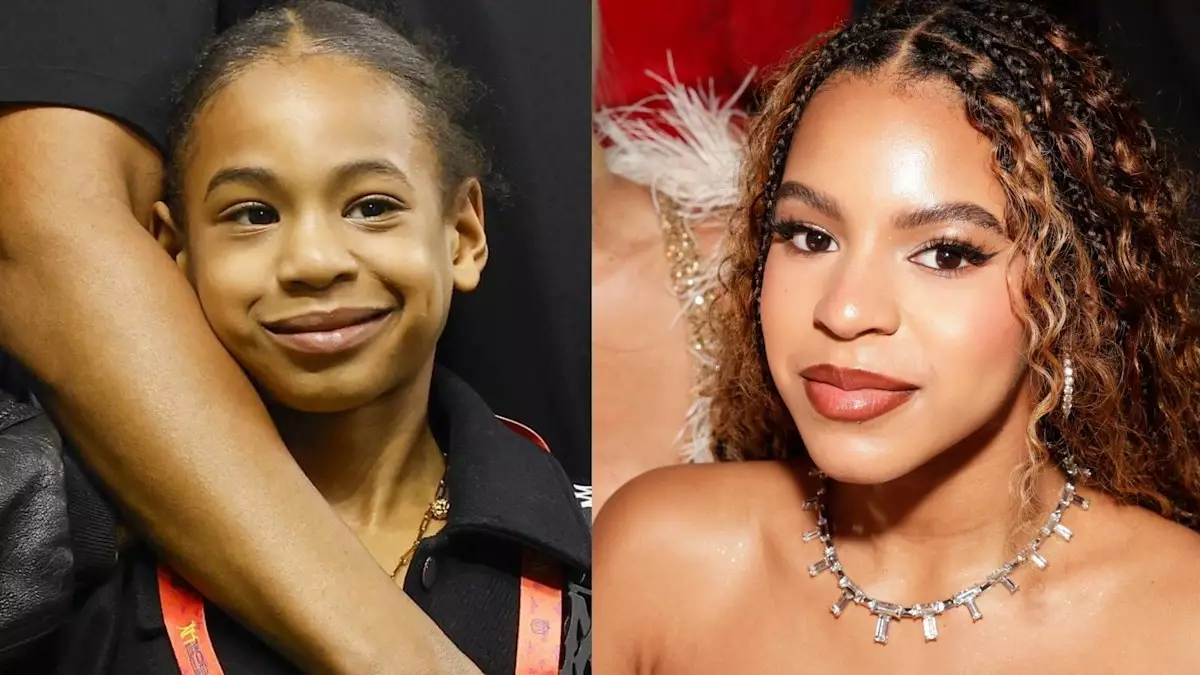Beyoncé, the iconic multi-talented artist, presents a fascinating case of motherhood interwoven with colossal fame. As a global superstar and a devoted mom, she must navigate the intricate path of protecting her children while fostering their individuality. The juxtaposition of her immense celebrity status against her desire to maintain a semblance of normalcy in her children’s lives forms the crux of her parenting philosophy. Notably, her dedication to proving that stardom does not equate to a lack of privacy is both admirable and necessary in today’s world where children of celebrities often find their lives laid bare for public scrutiny.
During her Renaissance World Tour, this dynamic came to the fore when her eldest daughter, Blue Ivy, expressed a desire to perform alongside her iconic mother. Beyoncé initially held a firm stance on the appropriateness of having an 11-year-old on a grand stage, illuminating her protective instincts. Yet, rather than stifling Blue’s ambition, she eventually allowed her to grace the stage, marking both a moment of maternal compromise and the start of Blue’s own artistic journey. This pivotal decision underscores a significant aspect of Beyoncé’s parenting: she is nurturing her children’s ambitions while carefully managing the risks that come with such visibility.
From Stage Strictures to Supportive Growth
Beyoncé’s approach has evolved remarkably, indicating a deep understanding of her children’s desires and the positive impact of performing. As Blue Ivy matured, her on-stage performances transitioned from a tentative trial to a vibrant showcase of talent and spirit. Beyoncé herself noted how the experience catalyzed her daughter’s confidence, stating that Blue “grew more and more every night” during the tour. This transition highlights a fundamental element of effective parenting: recognizing when to let go and allow children to explore their passions. By integrating Blue into the tour, Beyoncé not only provided her child with invaluable experience but also cultivated a bond that thrives in shared creativity.
Simultaneously, the inception of Rumi’s stage presence saw Beyoncé increasingly relaxed her initial constraints. Rumi’s eagerness to join her mother and sister emanates a vibrant spirit that resonates with audiences. Beyoncé’s grandmotherly figure, Tina Knowles, emphasized that the desire for performance bloomed naturally within Rumi, further signifying a family culture that values artistic expression and the joys of performance. This environment fosters a sense of belonging and encouragement rather than the pressures that often accompany childhood within the spotlight.
Celebrating Individuality Amidst Shared Goals
The dynamic between the Carter siblings paints a picture of uniqueness and connection. While Blue Ivy confidently assumes her role as a backup dancer with a burgeoning artistic identity, Rumi capitalizes on her own distinctive creative flair, adding her signature style to performances. Their contrasting personalities reflect an environment enriched by individual expression but unified by a common love for music and performance. The celebration of their individuality speaks volumes about Beyoncé’s influence as a parent — she encourages each child to thrive in their uniqueness while also valuing collaborative efforts.
Even Sir, Beyoncé’s more reserved son, remains an integral part of this narrative, albeit from a quieter stance. He may not seek the spotlight in the same way his sisters do, but his story serves as a reminder that each child within a family can blossom at their own pace. The balance within the Carter family — between exuberance and introspection — underscores Beyoncé’s adept handling of familial dynamics, as she consciously nurtures the different personalities within her home.
Normalcy in the Unusual
Beyoncé’s commitment to instilling a sense of normalcy in her children’s lives is particularly commendable in an era where fame often overshadows personal virtues. Despite the sleek surface of their public personas, Tina Knowles impressively relays that the Carter children are “just normal kids.” This fundamentally raises discussions around celebrity culture and the role of public figures in shaping perceptions of childhood. Beyoncé’s emphasis on privacy serves as a potent reminder that fame should not dictate one’s formative experiences.
Moreover, her nuanced approach to parenting encourages dialogue about how celebrity parents can raise children who are grounded and self-aware. By opting to weave lessons of humility, creativity, and resilience into the fabric of her family’s life, Beyoncé presents a refreshing counter-narrative to the overwhelming phenomenon of privilege that often accompanies fame. The Carter children, despite their extraordinary lineage, are experiencing childhood enriched with meaningful connections and opportunities for personal growth.
Beyoncé’s parenting journey manifests as an intricate tapestry, where her children are both grounded in their artistry and encouraged to pursue their passions with vigor and independence. This balance of nurturing support and protective instincts ultimately crafts a legacy that transcends traditional celebrity parenting.
